Discover essential female hygiene tips for a confident and healthy life! From gentle cleansing to safe intimate practices, this guide covers it all. Read now!
Introduction to Female Hygiene Tips
In the journey towards overall well-being, paying attention to following female hygiene tips is of utmost importance. As women navigate the various stages of life, from puberty to menopause, maintaining proper hygiene practices is crucial for promoting physical health and emotional well-being. In this comprehensive guide, we delve into various aspects of female hygiene, offering practical women hygiene tips to incorporate into their daily lives.
Female Hygiene Tips: Understanding Female Anatomy
Before delving into female hygiene tips, it's essential to have a basic understanding of female anatomy. The vagina is a self-cleaning organ, equipped with a delicate balance of bacteria and natural lubrication. However, maintaining external cleanliness is equally vital to prevent infections and discomfort.
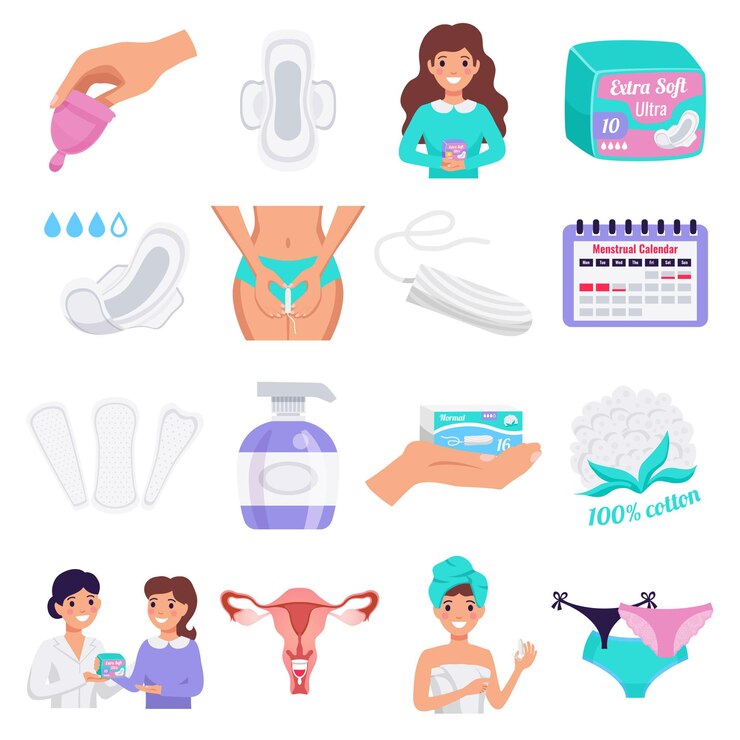
Essential Female Hygiene Tips
Following tips for feminine hygiene are very important for women hygiene:
- Gentle Cleansing Practices
One of the fundamental female hygiene tips is to adopt gentle cleansing practices. Use mild, fragrance-free soaps to wash the external genital area. Harsh chemicals can disrupt the natural pH balance, leading to irritation and infections. Remember to cleanse the area with warm water, avoiding douching as it can disturb the natural flora.
- Choosing the Right Feminine Products
When it comes to feminine hygiene products, making informed choices is key. Opt for sanitary pads and tampons made from breathable materials to minimize the risk of irritation. Consider trying organic or hypoallergenic options, especially if you have sensitive skin.
- Proper Menstrual Care
During menstruation, maintaining hygiene is crucial. Change sanitary products regularly to prevent bacterial overgrowth and odors. Wash your hands before and after handling menstrual products to avoid introducing harmful bacteria into the vaginal area.
- Cotton Underwear for Comfort
Wearing breathable cotton underwear is a simple yet effective hygiene tip. Cotton allows air circulation, reducing moisture and minimizing the risk of yeast infections. Avoid tight synthetic fabrics that can trap moisture and create a breeding ground for bacteria.
Female Hygiene Tips: Maintaining Intimate Health
- Regular Gynecological Check-ups
Routine gynecological check-ups are vital for monitoring reproductive health. Regular visits to a healthcare professional can help detect and address any potential issues early on. Discuss any concerns or changes in your menstrual cycle, discharge, or discomfort during these appointments.
- Safe Intimate Practices
Engaging in safe intimate practices is essential for both physical and emotional well-being. Use barrier methods of contraception to prevent sexually transmitted infections (STIs) and unintended pregnancies. Communication with your partner is key to ensuring a mutually respectful and consensual intimate relationship.
- Post-Intercourse Hygiene
After intercourse, it's advisable to urinate and clean the genital area gently. This helps flush out bacteria and reduces the risk of urinary tract infections (UTIs). Avoid using heavily scented products in the genital area, as they can disrupt the natural balance.
Female Hygiene Tips: Healthy Lifestyle Habits
- Balanced Diet for Vaginal Health
Maintaining a balanced diet rich in vitamins and minerals contributes to overall health, including vaginal well-being. Stay hydrated, consume probiotic-rich foods, and incorporate fruits and vegetables for optimal nutrition.
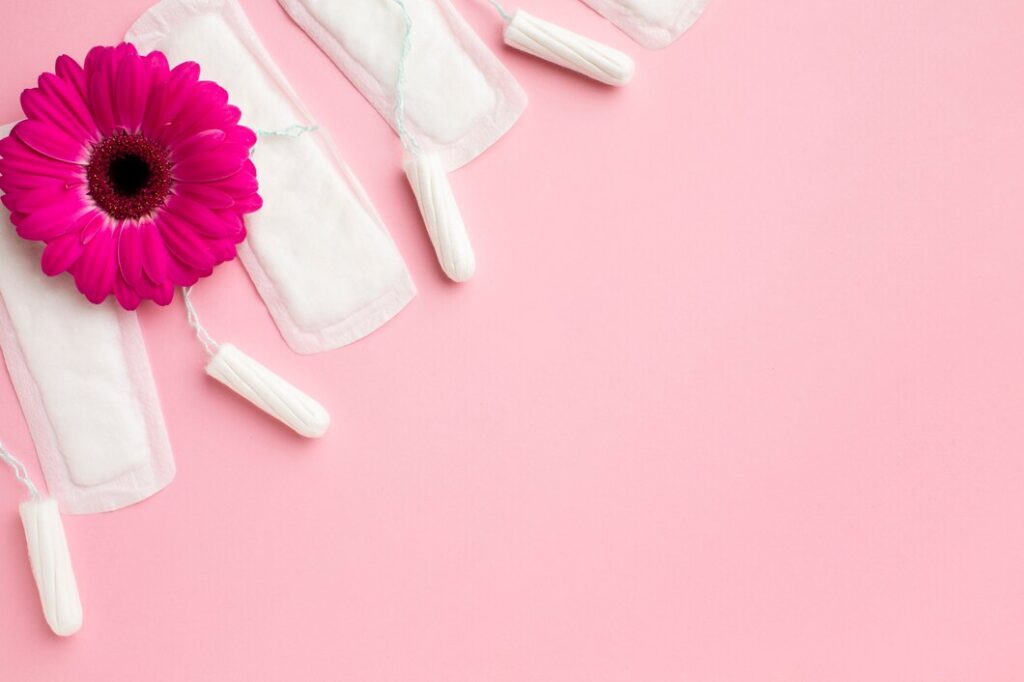
- Hydration and Its Impact on Vaginal Health
Adequate hydration is crucial for maintaining vaginal health. Water helps flush toxins from the body, including the genital area. Ensure you drink enough water throughout the day to support overall well-being.
- Regular Exercise for Circulation
Regular physical activity promotes healthy blood circulation, which is beneficial for reproductive organs. Incorporate exercise into your routine to enhance overall health and support menstrual regularity.
Female Hygiene Tips: Mental and Emotional Well-being
- Stress Management for Hormonal Balance
Stress can impact hormonal balance, affecting menstrual cycles and overall reproductive health. Adopt stress management techniques such as meditation, yoga, or deep breathing exercises to promote hormonal equilibrium.
- Adequate Sleep for Hormonal Regulation
Quality sleep is crucial for hormonal regulation. Aim for 7-9 hours of uninterrupted sleep each night to support the body's natural processes, including hormonal balance and immune function.
Female Hygiene Tips: Pregnancy and Postpartum Hygiene
- Prenatal and Postpartum Hygiene Practices
During pregnancy and postpartum, hygiene practices take on added significance. Maintain good perineal hygiene, especially after childbirth. Use gentle, fragrance-free products and consult healthcare professionals for personalized advice.
- Breast Care During Breastfeeding
For breastfeeding mothers, proper breast care is essential. Keep the breasts clean, wear breathable nursing bras, and address any concerns like cracked nipples promptly. Practicing good hygiene reduces the risk of infections and discomfort.
Female Hygiene Tips: Menopause and Beyond
- Menopausal Hygiene Considerations
As women enter menopause, hormonal changes impact vaginal health. Adequate lubrication may become essential to prevent discomfort during intimate activities. Use water-based lubricants and consult with healthcare professionals for guidance on managing menopausal symptoms.
- Bone Health for Postmenopausal Women
Postmenopausal women should focus on maintaining bone health through a calcium-rich diet, vitamin D supplementation, and weight-bearing exercises. Consult with healthcare professionals for personalized advice on postmenopausal well-being.
Female Hygiene Tips: Common Female Hygiene Challenges and Solutions
- Addressing Vaginal Infections Promptly
Vaginal infections are common but should be addressed promptly. If you experience unusual discharge, itching, or odor, consult with a healthcare professional for accurate diagnosis and appropriate treatment.
- Managing Urinary Incontinence
Urinary incontinence can affect women at various stages of life. Pelvic floor exercises, maintaining a healthy weight, and avoiding bladder irritants can help manage and prevent urinary incontinence.
- Preventing and Managing UTIs
Urinary tract infections (UTIs) are more common in women due to the proximity of the urethra to the anus. Stay hydrated, urinate after intercourse, and practice good hygiene to reduce the risk of UTIs.
- Embracing Positive Body Image
Finally, cultivating a positive body image is integral to female hygiene. Embrace and appreciate your body at every stage of life. Positive self-perception contributes to mental and emotional well-being, complementing physical hygiene practices.
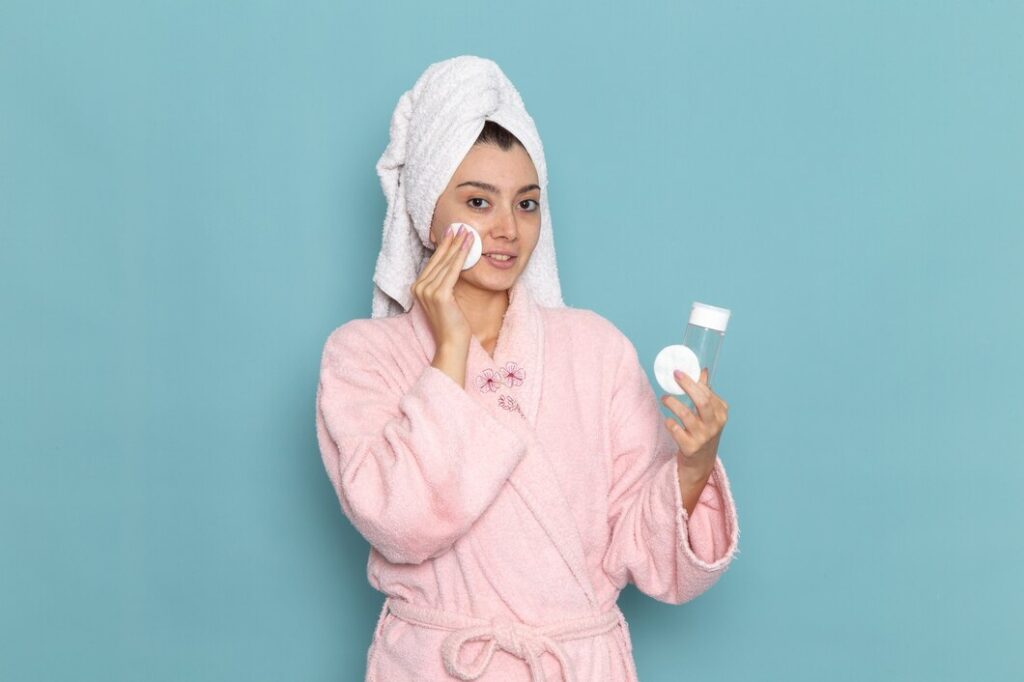
Maintaining Vaginal Health: Essential Female Hygiene Tips
The vagina, a self-cleaning organ, plays a crucial role in a woman's reproductive health. It harbors a delicate balance of bacteria, known as the vaginal microbiome, that contributes to its overall well-being. Maintaining proper female hygiene is essential for preserving this balance and promoting vaginal health. Here, we delve into comprehensive female hygiene tips, empowering women with the knowledge to make informed decisions about their intimate care.
Female Hygiene Tips: Understanding the Vagina’s Self-Cleaning Mechanism
The vagina is naturally equipped with a self-cleaning mechanism that works to maintain its pH balance and prevent harmful bacteria from taking over. This mechanism involves the production of vaginal fluids, which contain beneficial bacteria and lactic acid. Lactic acid creates an acidic environment, making it inhospitable for harmful bacteria to thrive.
Female Hygiene Tips for Everyday Wellness
- Gently Cleanse the Vulva: Daily gentle cleansing of the vulva, the external part of the female genitalia, is essential for female hygiene. Use mild, fragrance-free soap and warm water to avoid irritating the delicate skin. Avoid scrubbing or using harsh soaps, as these can disturb the vaginal microbiome.
- Wipe Front to Back: After using the toilet, wipe from front to back to prevent bacteria from being transferred from the anus to the vagina. This simple practice helps minimize the risk of urinary tract infections (UTIs).
- Choose Cotton Underwear: Opt for breathable cotton underwear, which allows for adequate airflow and prevents moisture buildup. Synthetic fabrics have the ability to retain moisture, which can foster the growth of bacteria.
- Change Underwear Daily: Change underwear daily to keep the vulva clean and dry. Damp underwear can promote bacterial growth and lead to discomfort or infections.
- Avoid Douching: Douching, the practice of rinsing the inside of the vagina with water or other solutions, is not recommended. The vagina is self-cleaning, and douching can disrupt the natural balance of bacteria, increasing the risk of infections.
- Practice Proper Hygiene During Menstruation: During menstruation, change menstrual products regularly to maintain hygiene and prevent odor. Dispose of soiled products properly to avoid the spread of bacteria.
- Wear Loose-Fitting Clothing: Tight-fitting clothing, especially pants or shorts, can trap moisture and heat, creating an ideal environment for bacterial growth. Choose loose-fitting cloths which allow proper ventilation.
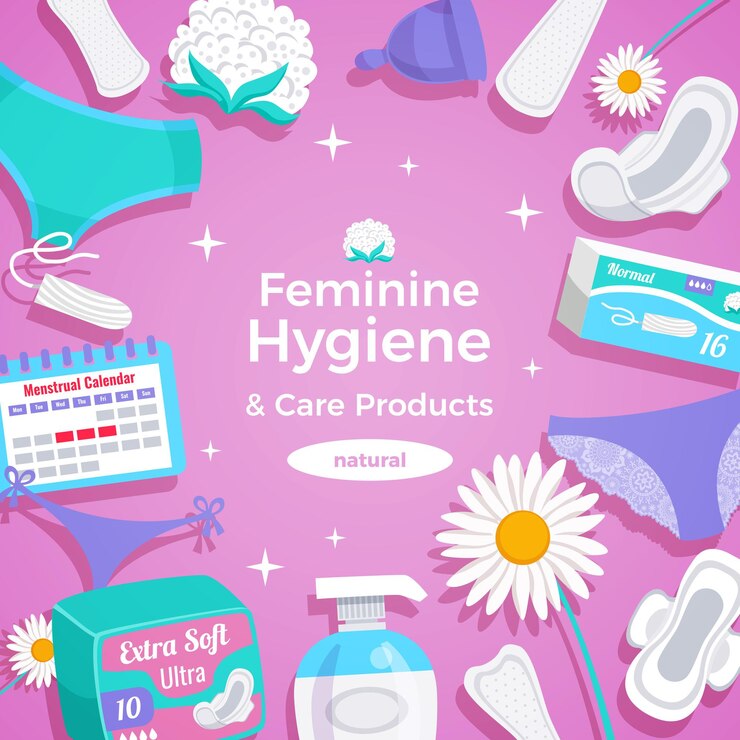
Additional Female Hygiene Tips for Specific Situations
- Post-Sexual Hygiene: After sexual intercourse, urinate to flush out bacteria from the urinary tract. Gently wash the vulva with mild soap and warm water. Avoid inserting soap or other products into the vagina.
- Managing Sweating: During physical activity or hot weather, sweating can increase in the vaginal area. Change into clean, dry underwear as soon as possible to prevent moisture buildup.
- Travel Considerations: When traveling, pack personal hygiene products, such as mild soap, unscented wipes, and menstrual supplies. Familiarize yourself with public restroom hygiene practices to minimize exposure to bacteria.
Female Hygiene Tips: Seeking Professional Guidance
Regular gynecological checkups are essential for maintaining overall reproductive health. During these visits, your gynecologist can assess your vaginal health, address any concerns, and provide personalized female hygiene advice.

Enhancing Feminine Hygiene: Important Female Hygiene Tips for Optimal Vaginal Health
Beyond the fundamental female hygiene tips outlined above, here are additional insights to further enhance feminine hygiene and promote optimal vaginal health:
- Moisturizing the Vulva: Apply the moisturizer sparingly to the outer vulvar area, avoiding direct contact with the vagina.
- Managing Pubic Hair: If you opt for pubic hair removal, consider methods like shaving, trimming, or waxing. Avoid harsh methods like depilatory creams or electrolysis, which can irritate the delicate skin of the vulva.
- Understanding Vaginal Discharge: Vaginal discharge is a normal occurrence, typically consisting of clear or white fluid. Consult your gynecologist if you experience yellow, green, or thick discharge, accompanied by itching, burning, or discomfort.
- Mindful Toilet Habits: Avoid straining while passing stool, and consider using a portable bidet or investing in a bidet attachment for your toilet to promote thorough cleansing and reduce the need for excessive wiping.
- Diet and Hydration: A balanced diet rich in fruits, vegetables, and whole grains contributes to overall health, including maintaining a healthy vaginal microbiome. Adequate hydration also plays a role in vaginal health, as it helps maintain a healthy balance of vaginal fluids.
- Managing Stress: Incorporate stress-management techniques into your daily routine, such as yoga, meditation, or deep breathing exercises.
- Sexual Health Practices: Safe sexual practices, such as using condoms and communicating with your partner about sexual health concerns, can help prevent sexually transmitted infections (STIs) that can affect vaginal health.
- Understanding Menopause: During menopause, hormonal changes can lead to vaginal dryness and irritation. Consult your gynecologist about options to manage these changes, such as vaginal lubricants or estrogen therapy.
Female Hygiene Tips: Navigating Feminine Hygiene Products
The market offers a wide array of feminine hygiene products, each with its own purpose and potential benefits.
- Soap: Choose mild, fragrance-free soaps specifically designed for delicate skin. Avoid harsh soaps or antibacterial soaps, which can disrupt the vaginal microbiome.
- Wipes: Opt for fragrance-free, unscented wipes that are gentle on the vulva. Avoid using wipes that contain alcohol or harsh chemicals.
- Menstrual Products: Choose menstrual products based on your personal preferences and flow intensity. Tampons, pads, and menstrual cups are all effective options.
- Vaginal Lubricants: Vaginal lubricants can provide relief from vaginal dryness, especially during sexual intercourse or during menopause. Choose water-based lubricants that are fragrance-free and pH-balanced.
- Vaginal Moisturizers: Vaginal moisturizers can help maintain moisture balance and reduce vulvar dryness. Choose fragrance-free, hypoallergenic moisturizers specifically designed for the delicate skin of the vulva.
Female Hygiene Tips: Common Feminine Hygiene Concerns and Solutions
- Vaginal Dryness: Vaginal dryness can occur due to hormonal changes, such as during menopause or after childbirth. Consult your gynecologist about treatment options, such as vaginal lubricants or estrogen therapy.
- Vaginal Odor: Vaginal odor is usually caused by changes in bacterial flora. Avoid douching, which can disrupt the vaginal microbiome. Wear breathable cotton underwear and consider using unscented vaginal deodorants.
- Vulvar Irritation: Vulvar irritation can be caused by various factors, such as harsh soaps, tight-fitting clothing, or frequent shaving. Identify the potential triggers and make adjustments to your routine. Use mild soap and fragrance-free products, opt for loose-fitting clothing, and consider alternative hair removal methods.
- Urinary Tract Infections (UTIs): UTIs are common in women and can be triggered by improper hygiene practices, such as wiping from back to front or using harsh soaps. Practice proper hygiene, avoid holding urine, and drink plenty of fluids to reduce the risk of UTIs.

By following these comprehensive female hygiene tips, you can promote optimal vaginal health, prevent infections, and enhance overall well-being.

Essential Hygiene Tips for Ladies
Maintaining excellent hygiene is fundamental to a lady's health and well-being. Fortunately, incorporating a few simple hygiene tips for ladies can significantly impact your overall health and confidence. Regularly showering or bathing with a gentle cleanser is vital, along with frequent handwashing using soap and water. Remember, specific hygiene tips for ladies cater to your face, hair, and intimate areas. Wash your face twice daily with a suitable cleanser and moisturizer, while shampooing and conditioning your hair based on its type.
For your intimate area, prioritize unscented products and avoid harsh chemicals or douches to maintain the natural pH balance. Ultimately, consistency is key! By integrating these essential hygiene tips for ladies into your daily routine, you'll contribute significantly to your overall well-being.
Here are some essential hygiene tips for ladies:
General tips for feminine hygiene:
- Shower or bathe regularly: Aim for daily showers or baths, especially after sweating or physical activity. Apply a mild cleanser that is appropriate for your skin type.
- Wash your hands frequently: Wash your hands with soap and water for at least 20 seconds, especially before eating, handling food, preparing meals, using the toilet, and after blowing your nose, coughing, or sneezing.
- Clean your face twice a day: Wash your face morning and night with a gentle cleanser and lukewarm water. Moisturize afterward to keep your skin hydrated.
- Brush and floss your teeth twice a day: Brushing and flossing removes plaque and food particles that can lead to cavities and gum disease.
- Trim and clean your nails regularly: Long nails can harbor bacteria, so keep them trimmed and clean.
- Wear clean clothes and underwear daily: This helps to prevent the growth of bacteria and keep you feeling fresh.
- Use feminine hygiene products appropriately: Choose unscented products and avoid using harsh chemicals or douches, which can disrupt the natural balance of your vagina.
- Get regular exercise: Exercise helps to boost your immune system and keep your body healthy.
Women hygiene tips for specific areas:
- Hair: Wash your hair regularly with a shampoo and conditioner suitable for your hair type. Refrain from overusing heat styling tools as this might lead to hair damage.
- Underarms: Shave or wax your underarms regularly to prevent sweat and odor.
- Feet: Wash your feet daily with soap and water, paying special attention to the areas between your toes. Dry your feet thoroughly and apply moisturizer to prevent dryness and cracking.
- Intimate area: Wash your vulva with warm water and a mild, unscented soap. Avoid using harsh soaps or douches, as these can disrupt the natural balance of your vaginal flora.
- Ears and nose: Clean your ears and nose regularly to remove dirt and wax buildup. Use a cotton swab dipped in warm water or a saline solution.
Additional tips for feminine hygiene:
- Drink plenty of water: Water helps to flush toxins from your body and keeps your skin hydrated.
- Eat a healthy diet: Eating a healthy diet rich in fruits, vegetables, and whole grains provides your body with the nutrients it needs to stay healthy.
- Get enough sleep: When you're well-rested, you're better able to fight off infections and maintain good hygiene habits.
- Listen to your body: If you notice any changes in your body odor, discharge, or skin, consult a doctor.
Women Hygiene Tips: Simple Steps for Optimal Health
Maintaining good hygiene is crucial for every woman's health and well-being. Thankfully, following some simple women hygiene tips can make a big difference.
Regular showering or bathing with a gentle cleanser, along with washing your hands frequently, are essential for overall cleanliness. Don't forget to incorporate specific women hygiene tips for your face, hair, and intimate areas. Wash your face twice daily with a suitable cleanser and moisturizer, while shampooing and conditioning your hair based on your hair type. For your intimate area, prioritize using unscented products and avoiding harsh chemicals or douches to maintain the natural pH balance.
Remember, consistency is key! following these fundamental women hygiene tips into your daily routine will significantly improve your overall health and confidence.
Conclusion: Embracing Healthy Female Hygiene Tips for a Lifetime Wellness
Maintaining proper female hygiene is an essential aspect of overall health, contributing to vaginal well-being, reducing the risk of infections, and enhancing overall well-being. By following these comprehensive female hygiene tips and dispelling common myths, women can empower themselves to make informed decisions about their intimate care, promoting a lifetime of vaginal health and vitality.
Remember, your vagina is a remarkable organ, and with proper care, it can thrive. Embrace gentle hygiene practices, listen to your body, and seek professional guidance when needed. With these empowering strategies, you can confidently navigate the world of feminine hygiene and maintain optimal vaginal health for years to come.
Frequently Asked Questions (FAQs) on Female Hygiene Tips
What is the importance of feminine hygiene?
Maintaining proper feminine hygiene is essential for preserving vaginal health, preventing infections, and promoting overall well-being. The vagina is a self-cleaning organ, but gentle care can help maintain its delicate balance and prevent issues like vaginal dryness, odor, or infections.
How often should I wash my vulva?
Daily gentle cleansing of the vulva, the external part of the female genitalia, is sufficient for maintaining feminine hygiene. Avoid excessive washing or scrubbing, as this can disrupt the natural balance of bacteria in the vagina.
What kind of soap should I use for feminine hygiene?
Opt for mild, fragrance-free soap specifically designed for delicate skin. Avoid harsh soaps or antibacterial soaps, which can disrupt the vaginal microbiome.
Is it necessary to douche?
No, douching is not recommended. The vagina is a self-cleaning organ, and douching can disrupt the natural balance of bacteria, increasing the risk of infections.
What type of underwear should I wear for feminine hygiene?
Choose breathable cotton underwear that allows for adequate airflow and prevents moisture buildup. Synthetic clothes may trap moisture resulting in an environment contributing to bacterial growth.
How often should I change my underwear?
Change underwear daily to keep the vulva clean and dry. Damp underwear can promote bacterial growth and lead to discomfort or infections.
What are some tips for feminine hygiene during menstruation?
During menstruation, change menstrual products regularly to maintain hygiene and prevent odor. Dispose of soiled products properly to avoid the spread of bacteria.
Can I use scented products for feminine hygiene?
Avoid using scented products, as these can irritate the delicate skin of the vulva and disrupt the vaginal microbiome.
How can I manage vaginal dryness?
Vaginal dryness can be caused by hormonal changes, such as during menopause or after childbirth. Consult your gynecologist about treatment options, such as vaginal lubricants or estrogen therapy.
What is the best way to deal with vaginal odor?
A mild vaginal odor is normal, especially after menstruation or exercise. However, persistent strong odors or a change in odor can indicate an underlying issue. Consult your gynecologist if you experience abnormal vaginal odor, especially accompanied by other symptoms like itching, burning, or discharge.
How can I prevent urinary tract infections (UTIs)?
Wipe from front to back after using the toilet to prevent bacteria from being transferred from the anus to the vagina. Avoid holding urine for extended periods. Drink plenty of fluids to help flush out bacteria from the urinary tract.
What are some tips for feminine hygiene after sexual intercourse?
After sexual intercourse, urinate to flush out bacteria from the urinary tract. Gently wash the vulva with mild soap and warm water. Avoid inserting soap or other products into the vagina.
How can I maintain feminine hygiene during travel?
Pack personal hygiene products, such as mild soap, unscented wipes, and menstrual supplies when traveling. Familiarize yourself with public restroom hygiene practices to minimize exposure to bacteria.
When should I see a gynecologist for feminine hygiene concerns?
Should you encounter any of the following, speak with your gynecologist:
o Persistent vaginal odor or changes in odor
o Vaginal itching or burning
o Unusual vaginal discharge
o Pain during urination or sexual intercourse
o Recurrent UTIs
Are there any special considerations for feminine hygiene during pregnancy?
During pregnancy, some women may experience changes in vaginal discharge or increased sensitivity. Consult your gynecologist for personalized advice on feminine hygiene during pregnancy.
How can I manage pubic hair for feminine hygiene?
Pubic hair serves a protective function, preventing friction and trapping moisture. While some women choose to remove pubic hair for personal preferences or hygiene reasons, it is not essential for maintaining vaginal health. Consult your healthcare provider if you have concerns about pubic hair removal methods and their potential impact on vaginal health.
What are some common myths about feminine hygiene?
Myth: Douching is necessary for vaginal cleanliness.
Myth: The vagina needs special soaps or cleansers.
Myth: Frequent bathing or showering is essential for feminine hygiene.
Myth: A healthy vagina should be tight and smell like flowers.
How can I stay informed about feminine hygiene?
Regularly check with your gynecologist for personalized advice and updates on feminine hygiene practices. You can also find reliable information from reputable sources like the American College of Obstetricians and Gynecologists (ACOG) or the National Women's Health Information Center (NWHIC).
What can I do to prevent yeast infections?
Yeast infections are a common type of vaginal infection caused by an overgrowth of yeast, usually Candida albicans. To prevent yeast infections:
-> Maintain proper feminine hygiene.
-> Avoid tight-fitting clothing that traps moisture.
-> Choose breathable cotton underwear.
-> Avoid using perfumed products near the vagina.
-> Manage stress levels, as stress can contribute to yeast infections.
-> Consider probiotics, which are beneficial bacteria that can help maintain a healthy vaginal microbiome.
What is the best way to manage sweating in the vaginal area?
Sweating in the vaginal area is common, especially during physical activity or hot weather. To manage sweating:
o Wear loose-fitting, breathable clothing to allow for airflow.
o Change into clean, dry underwear as soon as possible after sweating.
o Use unscented panty liners to absorb moisture.
o Consider using a portable bidet to cleanse the vulva after sweating.
More about Female Hygiene Tips
Beyond the daily basics, Female Hygiene Tips often miss a hidden realm: mental well-being. Stress and anxiety can disrupt your body's delicate balance, impacting everything from hormone regulation to vaginal health. So, add these unique Female Hygiene Tips to your mental wellness regime! Practice mindfulness through meditation or yoga, prioritize sleep with relaxing routines, and nourish your body with a balanced diet rich in probiotics. This holistic approach to Female Hygiene Tips empowers you to cultivate not just outer cleanliness, but a vibrant inner landscape where your body flourishes. Remember, true female hygiene encompasses both body and mind – so prioritize your mental well-being and watch your confidence bloom alongside your health.
Read more on female hygiene tips here.
Related Posts:
1. Male Hygiene Tips
2. DIY Spa Day at Home Bliss: Your Ultimate Guide 101

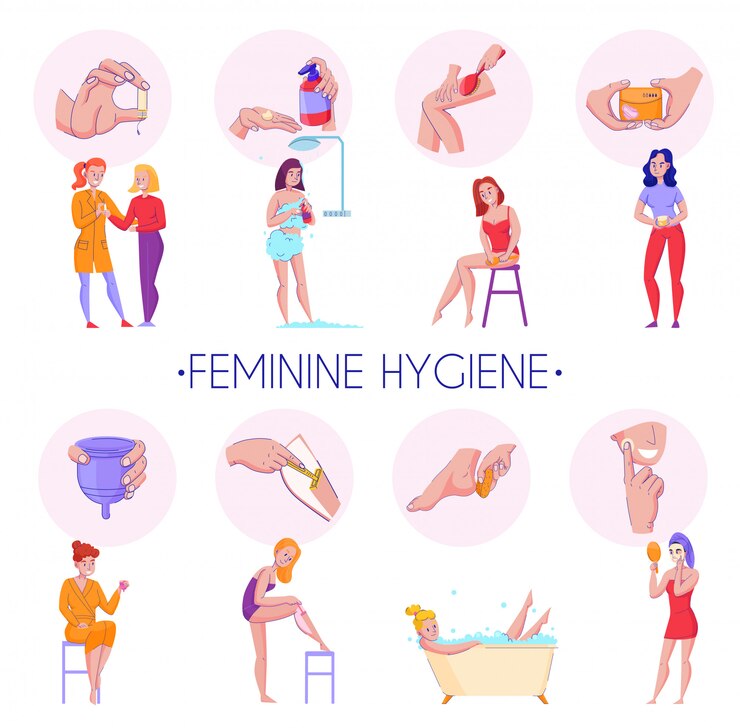
Great website. Plenty of useful information here. I?¦m sending it to a few pals ans also sharing in delicious. And certainly, thanks to your effort!
Utterly composed subject material, Really enjoyed reading.